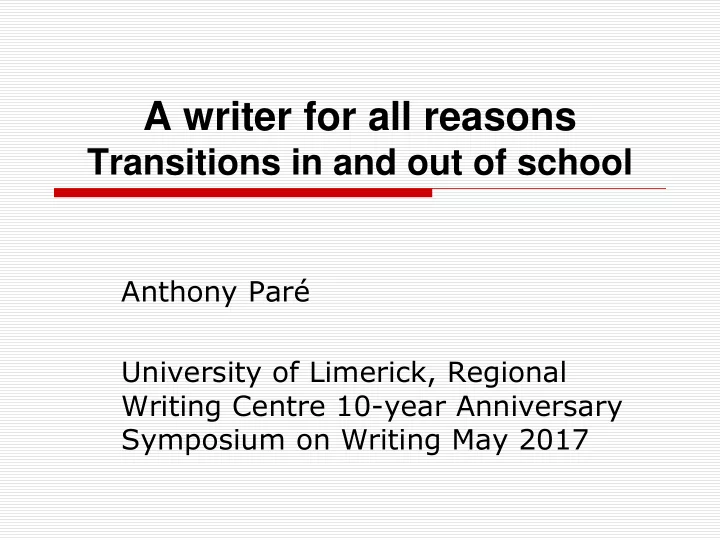

A writer for all reasons Transitions in and out of school Anthony Paré University of Limerick, Regional Writing Centre 10-year Anniversary Symposium on Writing May 2017
A growing understanding of writing Culture Setting Writer Text
Cognitive process model
Process perspective texts evolve through stages/phases writing is heuristic/generative the writing process comprises sub- processes goal-setting planning an evolving sense of audience and purpose guides writers
A growing understanding of writing Culture Setting Writer Text
Social perspective writing intention/purpose is communal format/genres are shared resources writing is a collective heuristic texts are woven into practice texts are often co-authored (or no- authored) texts have multiple readers/readings texts are multimodal, multimedia
A growing understanding of writing Culture Setting Writer Text
Cultural perspective texts depend on local knowledge texts embody collective values, beliefs, assumptions texts enact collective aspirations, desires textual practice is learned by osmosis through participation textual participation is enculturation
A growing understanding of writing Culture Setting Writer Text
What does writing do? …explores, proposes, explains, argues, orders, challenges, convinces, describes, outlines, implies, summarizes, amuses, directs, speculates, recommends, advises, suggests, illustrates, portrays, expresses, encourages, persuades, assures, dissuades, influences, advocates, exposes, intimidates, counsels, opposes, endorses, conveys, states, questions, demands, imagines, delights, misleads, provokes, reviews, attacks, consoles, reports, narrates, berates, mediates, delegates, delineates, ameliorates, records, enlightens, identifies, elaborates....
. . . I have found smart, accomplished colleagues in other disciplines who have little vocabulary for discussing writing beyond the corrective grammar they learned in high school. Although they have learned the genres of their profession and are successful in them, their reflective ability to manipulate them is limited because of a lack of linguistic and rhetorical vocabulary and analytical methods. Their fairly developed language practice has not been professionalized or transformed through internalizing those disciplinary knowledges which would provide them a more sophisticated stance. (Bazerman, 2009, p. 289)
Thank you! anthony.pare@ubc.ca
Recommend
More recommend